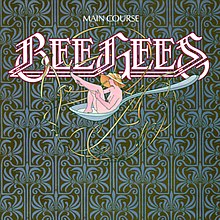Main Course (album)
| Main Course | ||||
|---|---|---|---|---|
 |
||||
| Studio album by Bee Gees | ||||
| Released | June 1975 (UK) August 1975 (US) |
|||
| Recorded | 6 January – 21 February 1975 Criteria Studios, Miami, Florida and Atlantic Studios, New York City |
|||
| Genre | Pop rock, disco | |||
| Length | 40:56 | |||
| Label | RSO | |||
| Producer | Arif Mardin | |||
| Bee Gees chronology | ||||
|
||||
| Singles from Main Course | ||||
|
||||
| Professional ratings | |
|---|---|
| Review scores | |
| Source | Rating |
| Allmusic | |
| Robert Christgau | B+[1] |
| Rolling Stone | (ambivalent) |
Main Course, released in 1975 for the RSO label, is the 13th album by the Bee Gees, and their last album to be released by Atlantic Records in the US under its distribution deal with Robert Stigwood. This album marked a change for the Bee Gees as it was their first album to include disco influenced songs, and it created the model for their output through the rest of the 1970s. It was the group's thirteenth album (eleventh worldwide). Main Course was the first album to feature keyboardist Blue Weaver. The album cover with the band's new logo designed by US artist Drew Struzan made its first appearance here.
Working with Atlantic producer Arif Mardin, who had also produced their previous album, Mr. Natural, and engineer Karl Richardson at Criteria Studios in Miami, their music became much more influenced by dance music, primarily the Caribbean-styled disco being produced in Miami at the time. Main Course also featured the first prominent use of Barry Gibb's falsetto. From Mr. Natural, the brothers retained new drummer Dennis Bryon and longtime lead guitarist Alan Kendall but added a new keyboard player in the form of Bryon's former Amen Corner colleague Blue Weaver who would become one of only a small handful of non-Gibb musicians to receive composition credits on Bee Gees songs. At the suggestion of Eric Clapton, the Bee Gees moved to Criteria Studios in Miami, to start recording their next album. Barry recalls on Clapton's suggestion when he was trying to make a comeback, "Eric said, 'I've just made an album called 461 Ocean Boulevard in Miami. Why don't you guys go to America and do the same and maybe the change of environment will do something for you?', I think it was really good advice".
...
Wikipedia
